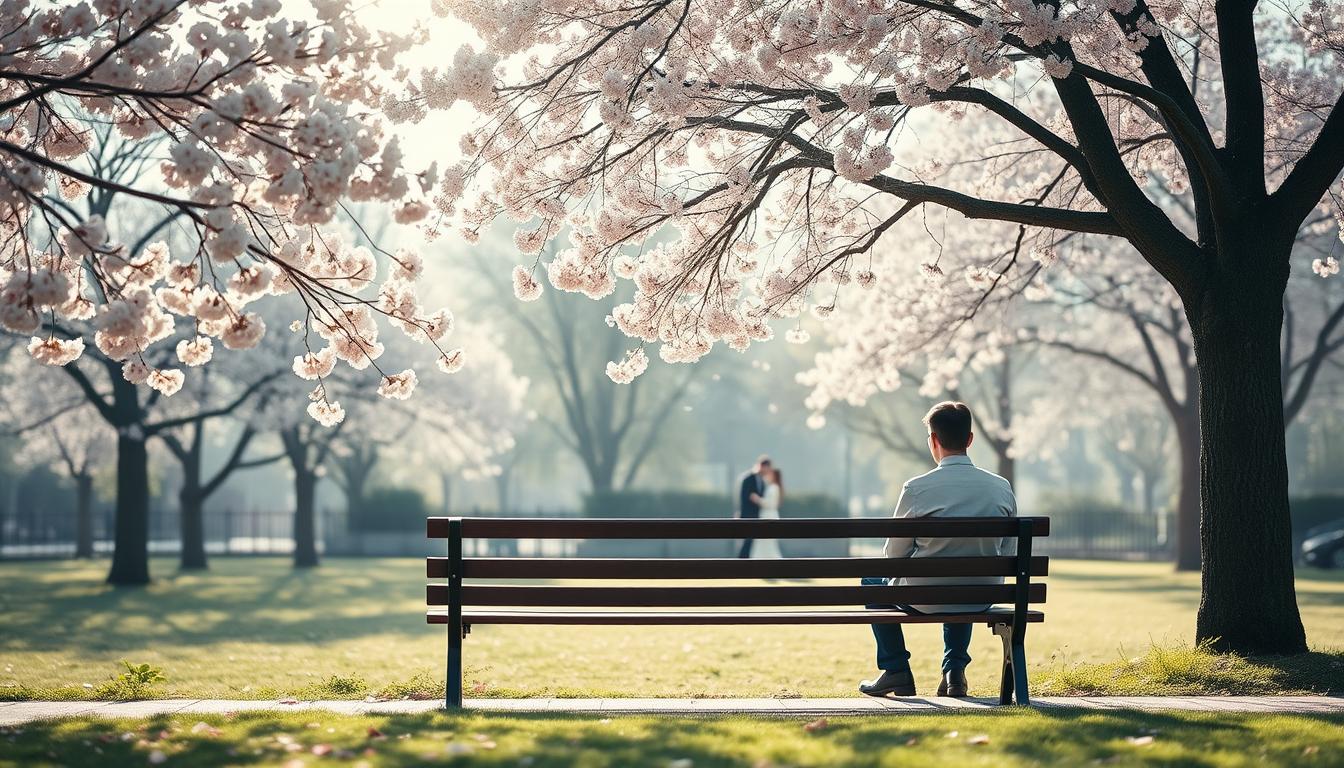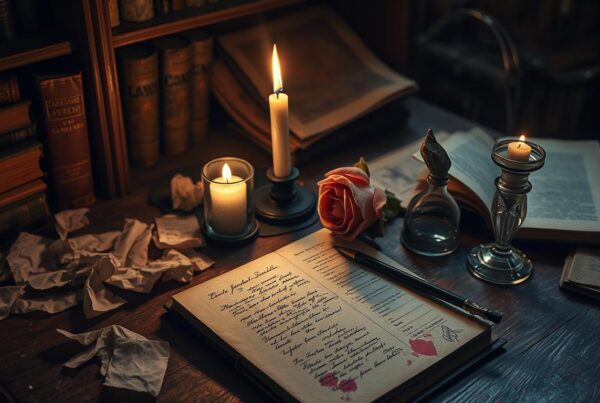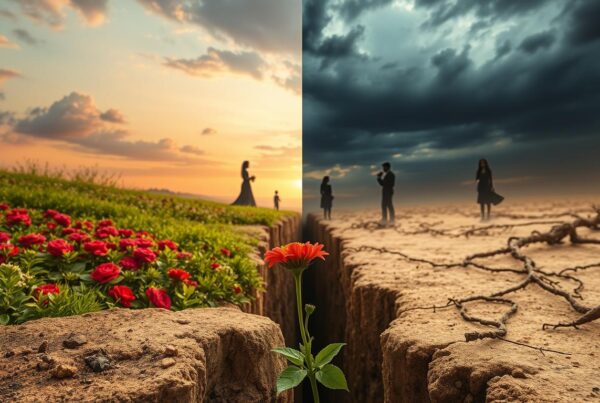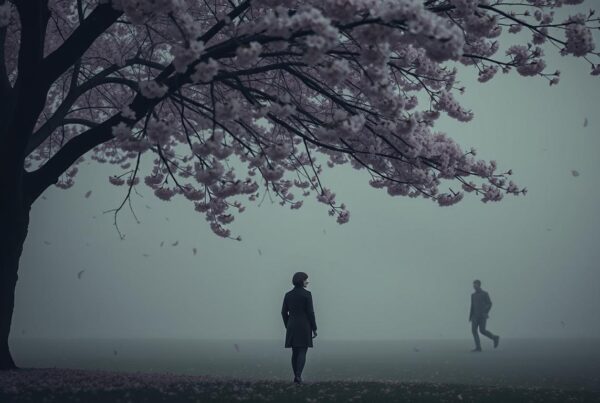Unrequited love is a common feeling that touches many hearts. It shows deep emotional yearning and romantic longing. When love isn’t returned, it can be painful but also beautiful.
This kind of love can change how we feel and grow. It can even inspire creativity. Unrequited love has been celebrated in many ways, like in poetry and art.
People often see it as a pure and strong form of love. It shows how complex our feelings can be. Exploring unrequited love helps us understand ourselves better.
Understanding Unrequited Love
Unrequited love is a strong, often overwhelming feeling of love that isn’t returned. It can be a short crush or a long-lasting feeling that causes a lot of emotional pain. Feeling unreciprocated feelings can be very hard, making people struggle with love unreturned.
Psychologically, unreciprocated feelings can cause strong emotional reactions. The pain of love unreturned can make people feel lost and less worthy. A key concept is limerence, introduced by psychologist Dorothy Tennov. It describes a deep, obsessive desire for someone.
Limerence mixes fascination, yearning, and emotional dependency. People in this state can’t stop thinking about the one they love. This makes the emotional pain of unrequited love even worse.
Some people might only feel a little sad about unattainable love. But others can face big psychological and emotional challenges. It’s important to understand the different ways unrequited love affects us. This helps us deal with the complex feelings it brings.
Historical Perspectives on Unrequited Love
Unrequited love has been a big theme in history. It’s found in literature, art, and culture. Each time period had its own way of showing this emotion.
The Medieval Love Ideal
In the medieval times, Courtly Love was a big deal. It was a kind of love that was often out of reach. This kind of romantic literature made the pursuit of love seem noble.
Stories like Sir Lancelot and Queen Guinevere showed knights’ devotion. They did brave deeds for their love. This idea of unattainable love has lasted in literary themes for a long time.
Renaissance Romance and Longing
In the Renaissance, artists and writers like William Shakespeare added depth to love stories. His plays, like “Romeo and Juliet” and “Twelfth Night,” showed the ups and downs of unrequited love. These stories went beyond courtly love to show real human feelings.
Modern Interpretations in Literature and Film
Today, stories about unrequited love are still popular. Books like “The Great Gatsby” by F. Scott Fitzgerald and movies like “La La Land” show the pain and growth it brings. These stories show that the themes of longing and heartache are still important today.
The Psychology Behind Unrequited Love
Unrequited love makes us look deeper into its effects on our minds. It’s about loving someone who doesn’t feel the same way. This can deeply affect us, based on how we attach to others and our brain’s chemicals.
Attachment Styles and Unreciprocated Feelings
Attachment Theory helps us understand how early relationships shape our adult ones. People with secure attachment styles might handle unrequited love better. But those with anxious or avoidant styles might feel more pain.
How well we deal with love’s pain depends on our attachment style. This affects how much we get caught up in love addiction.
Neurochemical Reactions to Rejection
Our brain reacts in complex ways to unrequited love. When we’re rejected, our dopamine and serotonin levels drop. This makes us feel sad and hopeless.
Knowing how our brain reacts to rejection helps us understand its effects. The pain of not being loved taps into our deep fears of being alone. This makes the cycle of emotional pain and love addiction harder to break.
Common Experiences of Unrequited Love
Unrequited love is a strong feeling that touches many lives. It creates a mix of emotional pain and deep longing. We will look at two common ways this love shows up, and how it deeply affects those who feel it.

Crushes that Never Bloom
Crushes start with a simple admiration, filled with hope. They begin with looking at someone you like from afar. But, many times, these feelings never grow into something more.
This leaves people feeling not good enough and hurt. It can hurt their self-esteem and change how they see love.
Love Lost and Never Found
At times, unrequited love is a deep and painful journey. People put a lot of themselves into a love that isn’t returned. This can lead to a lot of sadness and grief.
This kind of love leaves a lasting memory of what could have been. It makes people keep longing and feeling sad. The pain is not just about losing, but also about the dream of love that didn’t happen.
When Love Isn’t Returned: The Beauty of Unrequited Romance
Unrequited love can be a powerful force for growth and creativity. It brings deep self-reflection and artistic expression. This longing can inspire many forms of art, capturing human longing and heartache.
Many find solace and inspiration in unrequited love. It makes us feel vulnerable, touching our humanity’s core. These feelings can turn a simple crush into a story of emotional strength.
Romantic yearning makes loving someone from afar beautiful and sad. It shows the complex nature of love. This makes unrequited love a rich subject for both personal reflection and art.
Recognizing the Signs of Unrequited Love
It can be hard to tell if a relationship is mutual or one-sided. The signs of unrequited love start small and grow clearer. Knowing these signs is key to understanding your feelings.
Subtle Hints and Misunderstandings
At first, signs of unrequited love are subtle. You might see one person always trying to reach out. They plan things and show love, but the other doesn’t seem to care as much.
This difference in effort can lead to misunderstandings. These small clues are important signs of a one-sided relationship.
Clear Signs and Emotional Impact
As time goes on, the signs become clearer. You might get ignored, plans get canceled, or someone shows no real interest. This can be very hard to deal with.
Feeling rejected, doubting yourself, and feeling sad are common. Seeing these signs helps you understand your feelings. It’s a step towards taking care of yourself.
Stories of Famous Unrequited Loves
Unrequited love has inspired many famous stories. These tales go from ancient myths to modern heartbreaks. They show the universal longing and desire that often goes unfulfilled. Let’s explore three types of unrequited love stories.
Classical Myths and Legends
In ancient myths, unrequited love is a big theme. The story of Echo and Narcissus is a classic example. Narcissus fell in love with his own reflection, ignoring Echo’s love.
The tale of Daphne and Apollo is another famous story. Daphne’s love for Apollo was not returned. These stories show the deep pain of unrequited love.
Historical Figures and Their Unanswered Loves
Many historical figures have been in unrequited love. Queen Elizabeth I loved Robert Dudley, but it was never returned. Ludwig van Beethoven wrote “Immortal Beloved” letters, showing his deep, unreciprocated love.
These stories show that even famous people can feel the pain of unrequited love.
Modern Stories of Heartache
Modern stories of heartache still touch our hearts. F. Scott Fitzgerald’s “The Great Gatsby” tells the story of Jay Gatsby’s love for Daisy. The movie “500 Days of Summer” also explores unrequited love.
These stories remind us that unrequited love is a universal experience.
The Role of Unrequited Love in Personal Growth
Unrequited love is a deep dive into our emotions. It’s painful but also helps us grow. We learn more about ourselves and how to feel for others.
Learning Resilience and Empathy
Unrequited love teaches us to be strong. It’s hard to deal with feelings that aren’t returned. But we learn to get back up and grow.
It also makes us more understanding of others. We feel their pain more deeply. This helps us connect better with people.

Finding Strength in Vulnerability
Unrequited love teaches us to be brave. It’s about facing our feelings, even if they’re not shared. This makes us stronger and more resilient.
It helps us heal and connect with ourselves and others. We learn to be true to our feelings.
How to Cope with Unrequited Love
Dealing with unrequited love can hurt a lot. But, there are ways to get through it. Taking care of yourself and being kind to yourself are key steps. They help you heal and move on.
Self-Care and Self-Compassion
Self-care is very important when you’re heartbroken. Let yourself feel your feelings without judging. Mindfulness and meditation can help you accept yourself and feel better.
Doing things you enjoy can also help. This could be hobbies, exercise, or creating art. It distracts you from your pain and makes you feel good.
Building a Support System
Having people to support you is very important. Talk to friends and family who can offer comfort. They can help you see things differently.
Therapists can also help. They offer advice and ways to cope. Having people you trust by your side makes the journey easier.
Unrequited Love in Popular Culture
Unrequited love is a big theme in popular culture. It’s seen in movies, songs, and books. These forms of media show the deep feelings and longing of unreciprocated love.
Movies That Explore Unreciprocated Feelings
Movies often show unrequited love in a deep way. Films like “500 Days of Summer” and “Her” show the complex emotions of unreturned love. These stories make us think about our own feelings and the world of love.
Songs and Their Poignant Lyrics
Songs about unrequited love touch our hearts. Songs like Adele’s “Someone Like You” and Whitney Houston’s “I Will Always Love You” express deep sadness. They make us feel less alone in our heartache.
Books That Delve into Longing and Desire
Books also explore unfulfilled love. Classics like “Wuthering Heights” and modern works like “Norwegian Wood” show the pain of longing. These stories let us see the beauty and pain of one-sided love, adding to the world of Romantic Fiction.
Attempting to Transform Unrequited Love
Dealing with unreciprocated love can feel like a big challenge. Many people try to change these feelings into something mutual. But, it’s key to think if these efforts are good for everyone involved.
Improving yourself and boosting confidence is a common strategy. The idea is to become more attractive and possibly spark feelings in the other person. Yet, it’s vital to grow for yourself, not just to win someone over.
Another way is to create deeper connections through shared activities or talks. This method tries to turn unreciprocated feelings into something real. But, it’s crucial to respect the other person’s feelings and choices.
Getting advice from relationship counselors can also help. They offer safe and healthy ways to change feelings. But, knowing when to stop and move on is also important. Trying too hard can sometimes make things worse.
In the end, wanting to change unrequited love into something mutual is natural. But, it’s important to take care of yourself and respect others. Accepting the outcome, whether it’s good or bad, can help you grow and become stronger emotionally.
Why We Often Romanticize Unrequited Love
Unrequited love has a special charm that captures many hearts. It’s interesting to love someone without expecting it back. This feeling, called romantic ideation, is a big part of our stories and feelings.
But why do we idealize love even when it’s not returned? This is a big question.
The Ideals of Perfect Love vs. Real Love
One reason is the difference between perfect and real love. Perfect love is untouched by daily problems and flaws. It’s pure and free from everyday issues.
Real love, on the other hand, is about growing and facing challenges together. It might seem less exciting at first. But stories of unrequited love keep the idea of perfect love alive.
Media also plays a big role. Movies, books, and songs make unrequited love seem beautiful. They show deep emotions and longing, making it seem more meaningful than mutual love.
This makes us see unrequited love as more genuine and touching. Knowing this helps us understand our own feelings better.



